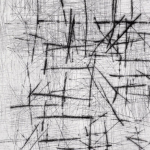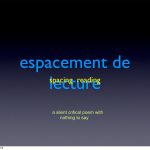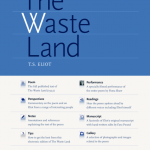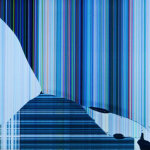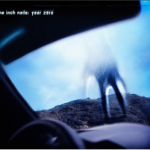2014
Giorgio Agamben has identified the “State of Exception” as the emergent principle of governance for the 21st Century. Parallel to this crisis in politics, there is the increasing currency of the term emergence in literary criticism, media theory, and cultural studies to describe the general state of change. In this paper, Heckman considers electronic literature in the "state of emergency," as both a laboratory for formal innovation and a site of critique. Specifically, this paper takes into account the relationship between literacy, law, literature and criticism through a reading of Sandy Baldwin’s New Word Order, a work that reimagines poetry in the context of the first-person shooter game.
Brian Kim Stefans proposes the need for a resistance to the "free play" associated with electronic writing, and discusses how this resistance will elevate electronic literature for both the author and the reader. He argues that poetic discharge is comparable with excess and bodily disgust, citing Sianne Ngai, and Steve McCaffery's "North of Intention." Stefans argues that avant-garde excess must be based on a balanced reflection on authorial presences. He draws his argument from his work on The Scriptor Project, which was inspired by his desire to bring "digital textuality back to the drama of the hand making marks on the page - literally dramatizing the act of writing by hand, the plays of body and mind that are erased in standard typography."
2013
According to Fabienne Collignon, Timothy Melley’s refusal to submit “clear vectors of resistance” to "so-called democratic states" in The Covert Sphere is far from a shortcoming of the work, and instead marks its distinct quality. The absence of clear political solution, Collignon contends, informs The Covert Sphere’s achievement as a call for a change of mind in a population who, wittingly or not, have "participated in, and continue to collaborate with, a system of pretended innocence and victimization."
Chris Funkhouser and Andrew Klobucar situate the poetry anthologized in the recent collection "Gnoetry Daily, Vol. 1: a collection of poetry written interactively with computers" within a long genealogy of computer aided writing in order to illustrate how that genealogy continues to be both aesthetically generative and socially significant.
Shoba Ghosh contends that in The Book of Portraiture, Steve Tomasula’s exploration of how artists in specific historic moments narrativize uncertainty in the constitution of the subject illuminates the conceptual framework that produces a number of significant global dynamics. According to Ghosh, Tomasula demonstrates that the contemporary subject’s body has become “no more than an agglomeration of brands” that can be “fashioned in the image of desire,” though at the same time, “desire also seeks to deterritorialize itself.” For Ghosh, Tomasula’s aesthetic treatment of that subject-defining tension ultimately assists in “track[ing] the loop by which Empire and Terrorism, State and Extremism, America and its 'other' produce each other simultaneously.”
According to Janez Strehovec, e-literature operates on the model of post-Fordist immaterial production. He argues it's precisely because "a part of contemporary art (especially the new media one and e-literature) is crossing into the service sector of (new) networked economy in the post-industrial, information, spectacle- and software society" that e-literature needs to cultivate its own autonomous context.
John Bruni contends that Cary Wolfe’s latest book "Before the Law: Humans and Other Animals in a Biopolitical Frame” discusses the “legal issues that inform our relationships with non-human animals.” Bruni writes that in doing so Wolfe dissects the process of law-making and appearing “before the law” as animals, which might be potentially harmful and eclipse the existence of animals beyond the human sphere. According to Bruni what distinguishes Wolfe’s perspective is that he does not promote any form of “ecological self-righteousness” but rather asks the question whether we need to move beyond species-based discourses that constantly pits humans and animals against each other in an essentially unwinnable impasse—to a more ethical approach that may expand the "community of living."
In his review of Christian Moraru’s recent Cosmodernism: American Narrative, Late Globalization, and the New Cultural Imaginary, Aron Pease considers the merits of the periodization advanced in that work. Ultimately, Pease argues that while the emphasis Moraru places on cosmodernism literature’s “relationality” means that the it is able to “register ‘the other’ as a concrete and organizing presence rather than as an abstract theme”, Moraru’s reliance on the nebulous term “globalization” fails to account for the extent to which the literature characterized as cosmodern reflects the political economy of late capitalism.
Maria Damon reviews Alan Sondheim's Writing Under: Selections from the Internet Text in light of the literature of John Fahey to demonstrate that those texts, like her performative review of them, enact a "mastering/dismantling itch twitch" that has a "life of its own, moving through the artist in a parasitic way."
This introduction is not a "digital" essay, but what follows it - a version of a moving essay-poem originally presented in real time at the 2012 elo conference - is. Florence's presentation explores how the "espacement" (Mallarme, Derrida) intrinsic to all writing changes in a born-digital context. The work reminds us of something we anticipated early in the formation of ebr - that 'critifiction' is and always has been the way to make essays in the digital era.
"At the Time of Writing" considers the role of proprioception and the embodied memory of writing and gesture as a critical component of readerly practices. Anna Gibbs and Maria Angel examine a series of works of born digital literature that use representational techniques to evoke an "ethos of touch" that is critical to the experience of the work. Gibbs and Angel conclude that feeling is key to the process of meaning-making, and that experimental interfaces foreground the importance of the body in literature.
Type enough questions, Lisa Swanstrom suggests, and "Galatea" answers Socrates' ancient call for a poetry that talks back. Using Emily Short's interactive fiction as a model, Swanstrom argues that the khora - the strange Platonic intermediary between form and copy - might serve as a guide for understanding the peculiar nature of literary interactivity itself.
Ralph Clare sees the new essay collection on William Gaddis as engaging a growing reassessment of the novelist's work. Taking up the task of moving the scholarship past the postmodern theories that framed and determined it for some time, Clare argues that 'The Last of Something' turns out to be the beginning of something more. Approaches in the collection range from new forms of biographical and contextual criticism, to theories of data storage and "bare life," but the nuance and ambition of the scholarship re-asserts the relevance of Gaddis.
Time to get anarchic! Ralph Clare's review of A Corrupted Pilgrim's Guide, the first scholarly take on Thomas Pynchon's 2006 Against the Day, zooms in and illuminates the novel's anarchist framework as the major claim and long-term contribution of the collection. The aesthetics and ethics of anarchism turn out to be not merely a theme in the novel's setting - the late ninetieth to early twentieth-century - but the way it impinges on our current situation.
Andrew Klobucar argues that a new iPad app for The Waste Land demonstrates, despite the developer's intentions and Eliot's fears, that the symbolic form of the database is irrepressible. According to Klobucar, Eliot bemoans the cultural impact of new media and technological innovation, though his poem--particularly through Pound's editorial notes and Eliot's added annotations--employs the structure of a database. The app for The Waste Land attempts to mitigate this tension by promoting a sing...
Reviewer Tim Keane suggests that Pete Townshend’s memoir Who I Am captures the tension animating The Who’s career, the duality of autobiographical blues and (art-school inspired) auto-destruction. But, Keane suggests, the book also articulates the written autobiography’s inevitable (if sometimes interesting) failure to achieve the “ex-static” atemporality of music. “I Can’t Explain" ends up telling us more about Townshend’s soul than Who I Am.
Andrew Reynolds reviews Stephen Schryer’s Fantasies of the New Class: Ideologies of Professionalism in Post-World War II American Fiction, which argues for an instrumental form of intellectual labor in the service of broader social goals. Comparing novelists and sociologists representative of this new class, Schryer detects a self-defeating strategy in their rejection of collective instrumentalism in favor of individual dissemination of cultural education. Where Schryer closes by criticizing recent conceptions of an alternative economy of non-instrumental intellectual work within the university as a fantasy, Reynolds observes a “performative contradiction” at work in Schryer’s text and suggests that it is a good thing.
Taking recent writings-of-internet as test cases, Stuart Moulthrop demonstrates the folly of deploying modernist compositional models, even avant-garde theories of citational and conceptual poetry recently popularized by Kenneth Goldsmith and the Flarf poets, to read born-digital writing. Though it may be fun, it's ultimately futile to interpret the contingent output of an "interface in process" as a poem existing in a fixed, terminable state. Perhaps, then, interfacing with databases is becoming integral to not just electronic literature and digital poetics but all forms of literary study and practice?
In this essay, Davin Heckman argues that works of electronic literature often provide occasions for cultivating attention in a mutable cultural landscape. Through readings of John Cayley, YHCHI, Rob Wittig, and Richard Holeton, Heckman points to a poetics of technical estrangement by which new media is opened up to deliberative reading, and thus presents contemporary readers with the opportunity to develop critical practices appropriate for the conditions of neoliberalism.
Adam Pilkey argues that the ARG Year Zero's use of "revealing noise" allows and encourages the audience to help in the building of the narrative by becoming participants in a conspiracy theory within the ARG. Pilkey argues that "The Presence" found in the Nine Inch Nails album and corresponding ARG, Year Zero, symbolizes and denies a truth, which in turn provides a means that furthers the resources that constructs conspiracy theories in this alternate reality.
